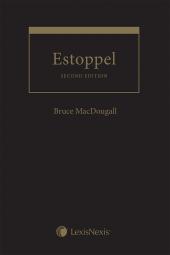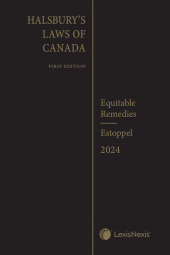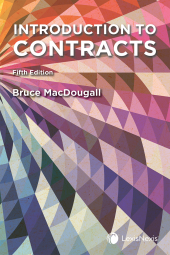Estoppel, 2nd Edition
One Year Subscription Only Terms
Subscribers receive the product(s) listed on the Order Form and any Updates made available during the annual subscription period. Shipping and handling fees are not included in the annual price.
Subscribers are advised of the number of Updates that were made to the particular publication the prior year. The number of Updates may vary due to developments in the law and other publishing issues, but subscribers may use this as a rough estimate of future shipments. Subscribers may call Customer Support at 800-833-9844 for additional information.
Subscribers may cancel this subscription by: calling Customer Support at 800-833-9844; emailing customer.support@lexisnexis.com; or returning the invoice marked 'CANCEL'.
If subscribers cancel within 30 days after the product is ordered or received and return the product at their expense, then they will receive a full credit of the price for the annual subscription.
If subscribers cancel between 31 and 60 days after the invoice date and return the product at their expense, then they will receive a 5/6th credit of the price for the annual subscription. No credit will be given for cancellations more than 60 days after the invoice date. To receive any credit, subscriber must return all product(s) shipped during the year at their expense within the applicable cancellation period listed above.
Product description
This book is one of a trilogy along with Misrepresentation and (Dis)Honest Performance in Contracts, 2nd Edition (2021) and Mistake in Contracting (2018) which cover the "Truth in Contracting" (or more accurately: "Untruth in Contracting").
Estoppel is understood at a basic level by many lawyers, but this set of legal doctrines is highly complex and filled with such confusing terminology, such that it poses a challenge for both practitioners and scholars alike. This is the first Canadian text book that clarifies the subject matter from a Canadian legal standpoint and deals with its complexity and subtleties in a manner that's easily understood. Written by a veteran University of British Columbia law professor, this civil litigation book pulls together various aspects of estoppel into one place, saving readers valuable research time, while educating them on the rules and principles of estoppel in a clear and organized manner.
Features
Contains useful reference charts to clarify terminological issues, and to categorize the five areas of estoppel:
- Estoppel by deed
- Estoppel by convention
- Estoppel by representation
- Promissory estoppel
- Proprietary estoppel
Discusses quasi-estoppel issues:
- Election and abandonment
- Examines the role of equity (and to a lesser extent, the common law) in estoppel
- Addresses the connection of estoppel with the doctrine of legitimate expectations
- Explores the question about when and how the Crown or third parties (including parties such as agents, successors in title, liquidators) can be bound by, or can raise, estoppel
Benefits
- It elucidates this complex and nuanced area of law, which is of fundamental importance for developing legal arguments using the doctrines of estoppel
- Understanding the potential ramifications of estoppel provides more options for advising clients on possible litigation avenues and judicial outcomes
- It distills estoppel precedents and rules into their essentials, while providing depth and breadth of comprehension and saving valuable research time
- It contributes to a more engaged discussion of estoppel by scholars, lawyers and judges
What’s New in this Edition?
- Significant discussion of the 2017 Supreme Court of Canada decision in Cowper-Smith v. Morgan that has clarified various matters to do with proprietary estoppel, including its pre-requisites, its effect and its ability to comprehend future property.
- Expanded coverage of various matters including: the meaning of a “cause of action”, the role and meaning of “equity”, the availability of estoppel to third parties, the nature of a “duty” to correct errors, the role and responsibility of agents when there are inaccuracies, the effect of entire contract clauses and the construction of contracts.
- The book also expands the treatment of the availability of estoppel in statutory and governmental contexts and how and when there can be appeals of estoppel decisions.
- Where there have been significant developments in English and Quebec law, those developments are also included.
Who Should Read This Book?
- Lawyers – learn how to use estoppel to advance or defend your legal case. Helps you create legal options that will help your client
- Legal academics and law professors – this book represents the Canadian authority on the doctrines of estoppel, as applied in Canadian courts
- Judges – this book serves as a comprehensive reference source on the doctrines of estoppel, and can be used to determine whether courtroom litigants have applied the doctrines in a correct manner
Table of contents
Cases Cited
Statutes Cited
I. Overview
II. Estoppel by Deed
III. Estoppel by Convention
IV. Estoppel by Representation
V. Promissory Estoppel
VI. Proprietary Estoppel
VII. Election
VIII. Abandonment
 Lexis Nexis
Lexis Nexis 


